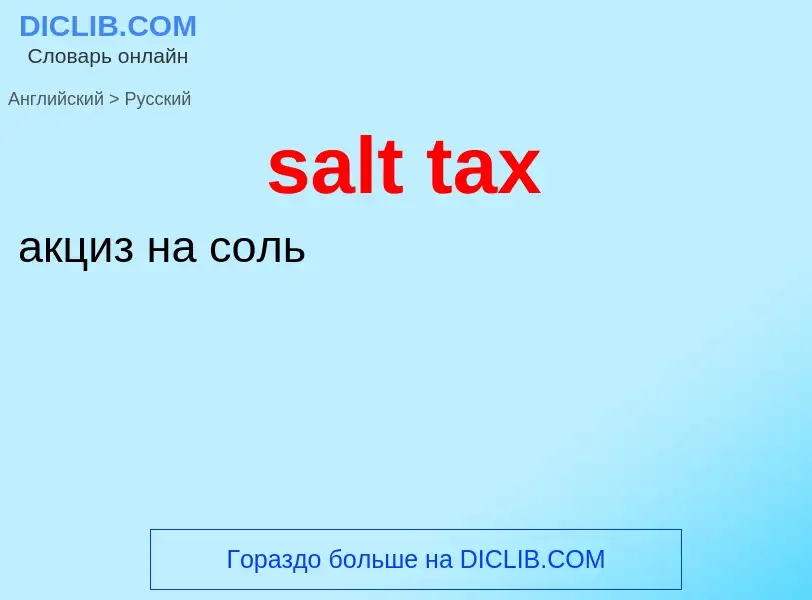ترجمة وتحليل الكلمات عن طريق الذكاء الاصطناعي ChatGPT
في هذه الصفحة يمكنك الحصول على تحليل مفصل لكلمة أو عبارة باستخدام أفضل تقنيات الذكاء الاصطناعي المتوفرة اليوم:
- كيف يتم استخدام الكلمة في اللغة
- تردد الكلمة
- ما إذا كانت الكلمة تستخدم في كثير من الأحيان في اللغة المنطوقة أو المكتوبة
- خيارات الترجمة إلى الروسية أو الإسبانية، على التوالي
- أمثلة على استخدام الكلمة (عدة عبارات مع الترجمة)
- أصل الكلمة
salt tax - ترجمة إلى الروسية
['si:sɔ:lt]
существительное
общая лексика
морская соль
تعريف
ويكيبيديا
A salt tax refers to the direct taxation of salt, usually levied proportionately to the volume of salt purchased. The taxation of salt dates as far back as 300BC, as salt has been a valuable good used for gifts and religious offerings since 6050BC. The salt tax originated in China, in 300BC and became the main source of financing the Great Wall As a result of the successful profitability of the Salt Tax, it began filtering through the rulings of nations across the world, France, Spain, Russia, England and India were the main regions to follow the Chinese lead. Salt was used as a currency during the Roman Empire and towards the end of their reign, the Romans began monopolising salt in order to fund their war objectives. Salt was such an important commodity during the Middle Ages that governments would often incorporate the salt trade as a state enterprise. Salt is one of the longest standing sources of revenue for governments, the taxation policy was so successful due to the vital role of salt within the human diet. Salt Taxing has been extremely influential in many of the political and economic revolts within history, resulting in important historic events including the French Revolution, the Moscow Salt Riot, the Salt March in India, and the Salt Tax Revolt in Spain.


![Golmud salt evaporation pans at [[Golmud]], August 1993 Golmud salt evaporation pans at [[Golmud]], August 1993](https://commons.wikimedia.org/wiki/Special:FilePath/1993 Golmud salt pans.jpg?width=200)

![Bamyan]], [[Afghanistan]] Bamyan]], [[Afghanistan]]](https://commons.wikimedia.org/wiki/Special:FilePath/CH-NB - Afghanistan, Bamiyan, Bamyan (Bamian)- Menschen - Annemarie Schwarzenbach - SLA-Schwarzenbach-A-5-20-159.jpg?width=200)
![Comparison of table salt with [[kitchen salt]]. Shows a typical salt shaker and salt bowl with salt spread before each on a black background. Comparison of table salt with [[kitchen salt]]. Shows a typical salt shaker and salt bowl with salt spread before each on a black background.](https://commons.wikimedia.org/wiki/Special:FilePath/Comparison of Table Salt with Kitchen Salt.png?width=200)
![[[Halite]] (rock salt) from the [[Wieliczka salt mine]], Małopolskie, Poland [[Halite]] (rock salt) from the [[Wieliczka salt mine]], Małopolskie, Poland](https://commons.wikimedia.org/wiki/Special:FilePath/Halit (NaCl) - Kopalnia soli Wieliczka, Polska.jpg?width=200)
![[[Himalayan salt]] is [[halite]] with a distinct pink color. [[Himalayan salt]] is [[halite]] with a distinct pink color.](https://commons.wikimedia.org/wiki/Special:FilePath/Himalayan salt of Saúde flea market, São Paulo, Brazil.jpg?width=200)
![evaporation pond]] in [[Walvis Bay]], [[Namibia]]; [[halophile]] organisms give it a red colour. evaporation pond]] in [[Walvis Bay]], [[Namibia]]; [[halophile]] organisms give it a red colour.](https://commons.wikimedia.org/wiki/Special:FilePath/Loading sea salt at evaporation pond, Walvis Bay (2014).jpg?width=200)
![[[Bread and salt]] at a Russian wedding ceremony [[Bread and salt]] at a Russian wedding ceremony](https://commons.wikimedia.org/wiki/Special:FilePath/Russian bread and salt.jpg?width=200)
![pre-Inca times]] pre-Inca times]]](https://commons.wikimedia.org/wiki/Special:FilePath/Salinas de Maras, Peru-20Sept2013.jpg?width=200)
![Salt production in [[Halle, Saxony-Anhalt]] (1670) Salt production in [[Halle, Saxony-Anhalt]] (1670)](https://commons.wikimedia.org/wiki/Special:FilePath/Salzproduktion-Halle.jpg?width=200)
![Irregular crystals of [[sea salt]] Irregular crystals of [[sea salt]]](https://commons.wikimedia.org/wiki/Special:FilePath/Sea Salt.jpg?width=200)
![Sea salt [[evaporation pond]] at [[Walvis Bay]]. [[Halophile]] organisms impart a red colour. Sea salt [[evaporation pond]] at [[Walvis Bay]]. [[Halophile]] organisms impart a red colour.](https://commons.wikimedia.org/wiki/Special:FilePath/Sea salt, evaporation pond Walvis Bay (2014).jpg?width=200)
![SEM]] image of a grain of table salt SEM]] image of a grain of table salt](https://commons.wikimedia.org/wiki/Special:FilePath/Single grain of table salt (electron micrograph).jpg?width=200)


![Raking salt depicted on a 1938 [[Turks and Caicos Islands]] postage stamp Raking salt depicted on a 1938 [[Turks and Caicos Islands]] postage stamp](https://commons.wikimedia.org/wiki/Special:FilePath/Turks and Caicos Islands raking salt stamp 1938.jpg?width=200)
